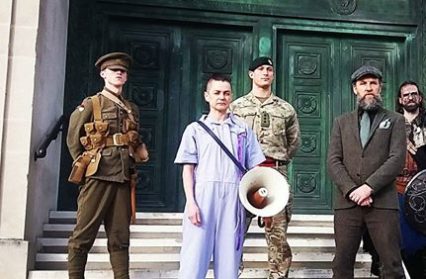Now The Hero, inspired by Frank Brangwyn British Empire Panels, a multidisciplinary artist takes his audience on a journey through the streets of Swansea.

Marc Rees’ latest work, commemorating a century since the Great War ended, is arguably his biggest and most important. Inspired by Frank Brangwyn’s British Empire Panels, the multidisciplinary artist takes his audience on a journey through the streets of Swansea. This isn’t just a commemoration of World War I though; Now The Hero is about the reverberations left behind by all wars, from ancient Celtic warriors to jeans-clad teenagers.
There’s no question that the visual impact of Brangwyn’s artwork looms large over Now The Hero, which has a pleasingly cinematic quality to it. Two such moments involving performer Eddie Ladd – one at the very beginning, one at the very end – are prime examples of this. Both sequences are beautifully realised, the latter genuinely awesome. Also pleasing is the inclusion of a community cast, who appear frequently and crucially throughout the piece. Under the composition of Owen Roberts and the late Johann Johannsson, Welsh choir Polyphony bring aural stimulation into the mix. All of this is underpinned by superb sound design by Mike Beer, his ominous cacophony of strings rising and falling like the tumults of battle.
Viscerally that’s wonderful but, crucially, what’s missing from these set-pieces, and the majority of Now The Hero, is emotional resonance. Too much of the production relies on an assumed knowledge from the audience; when that knowledge isn’t there, all of these beautifully crafted sequences end up hollow. The action at Brangwyn Hall (where the original artwork is displayed) demonstrates this perfectly. The main hall is plunged in red where an overly long sequence involving the Celtic Warrior is followed by an overly long rendition from the choir. The audience is then allowed to explore different rooms of the building, each containing some sort of self-contained performance art. That entire portion of the show is visually spectacular but far too abstract, to the point of confusion. The final sequence begins atop a clock tower and ends with the cast gathered like a funeral procession. Again, breathtakingly beautiful; but, again, difficult to contextualise without prior knowledge.
There’s also something very frustrating about all of this. Not so much the content itself – after all, no production will please every audience member or critic. What’s frustrating is the reliance on spectacle, especially for a project like this. Productions on this scale are inevitably going to be expensive, of course, but how that money is spent is so crucial. The inclusion of a speedboat at the beginning of the play feels utterly unnecessary, as does the use of the clock tower at the end. There’s no denying how spectacular the latter is, but when tackling a subject so important, is spending huge amounts of money on a wow moment the best foot forward? I’d say no. Emotional resonance would have come from learning more about the characters in the piece, but that is set aside in favour of spectacle. A costly spectacle.
There’s one caveat to all of this: Eddie Ladd. Ladd is the heart and soul of Now The Hero. From her opening monologue on Swansea Beach to her leading the audience like protestors through the streets of Swansea, she’s a constant force of energy and passion. There’s no wasted breath, every word and movement feels important and measured. She’s a joy to watch but, sadly, it feels like she’s in a completely different production to everybody else. After guiding the audience to Brangwyn Hall, she becomes a largely peripheral figure (until the very end), and the show suffers in her absence.
Now The Hero is epic, unquestionably, and there is something gratifying about a production that takes over a location in this way. Unfortunately, unlike its best performer, not everything that happens in this show feels important. Sometimes, it feels gratuitous. Marc Rees has once again succeeded in creating a spectacular show, but he’s just fallen short of creating one that will leave a mark.
For more information on Now The Hero, take a look at this website.
Jafar Iqbal is a regular contributor at Wales Arts Review.











